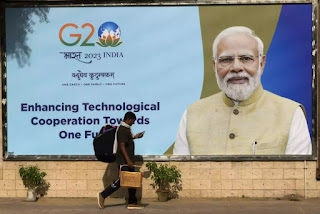G20 nations

Despite informal pressure to bring forward its 2070 net-zero target, India is unlikely to do that at this year’s G20 summit India took over the presidency of the G20 – the grouping of the world’s 20 biggest economies, which collectively account for 75-80% of global GHG emissions – in December 2022. At the transition of the presidency from Indonesia to India, the Indian prime minister, Narendra Modi, said the challenges of “climate change, terrorism, and pandemics can be solved not by fighting each other, but only by acting together”. With control of 84 per cent of the global economy, G20 nations are the world’s driving force for development and growth. This is a good thing. However, while acknowledging the diversity and different development paths within G20 nations, this strength and influence also makes the bloc largely responsible for many of the environmental issues facing the world today. In India, especially among civil society organisations, the focus is less on the date of the...


